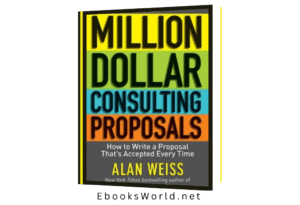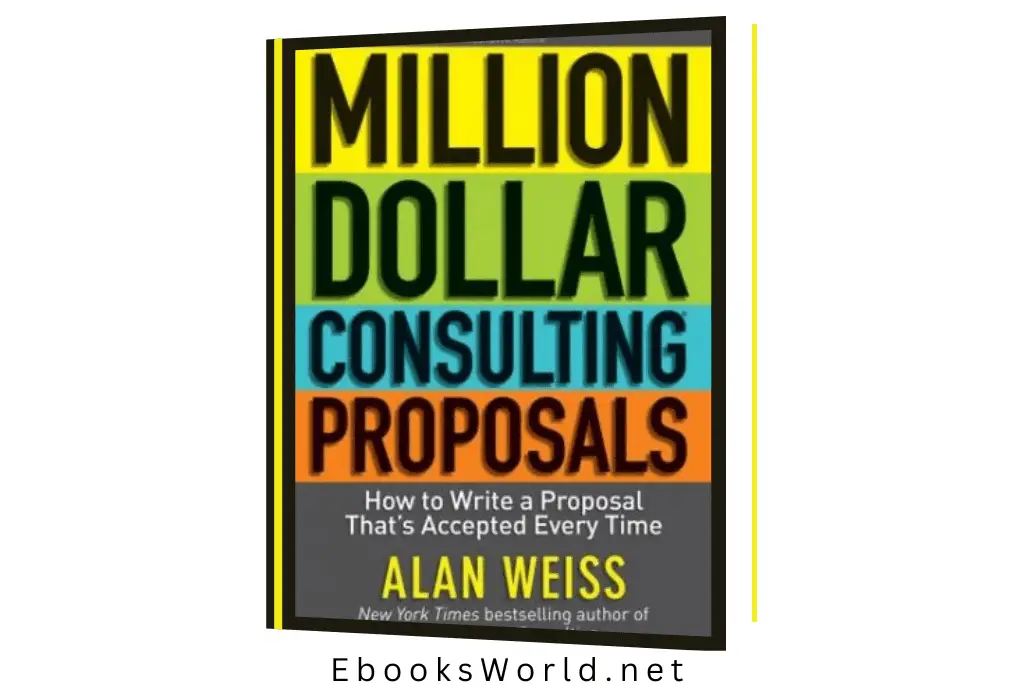Million Dollar Consulting Proposals: How to Write a Proposal That’s Accepted Every Time

“Million Dollar Consulting Proposals: How to Write a Proposal That’s Accepted Every Time” by Alan Weiss is a guide that provides practical insights and strategies for consultants looking to create compelling proposals that win business. The book emphasizes the importance of crafting proposals that focus on value, differentiation, and client needs. Here’s a summary of the key concepts covered in the book:
Introduction:
Alan Weiss begins by highlighting the significance of effective consulting proposals in winning clients and growing a consulting business. He argues that a well-crafted proposal is not just a formality but a critical tool for showcasing expertise and convincing clients to choose your services.
Chapter 1: The Purpose of a Proposal
Weiss explores the primary purpose of a proposal, which is not just to outline services but to create an agreement with the client. He emphasizes the need to address the client’s specific needs and concerns, showcasing how your services provide value and solutions.
Chapter 2: The Difference Between Proposals and Contracts
The author clarifies the distinction between proposals and contracts. While proposals focus on persuading clients to engage in a business relationship, contracts detail the terms and conditions of that relationship. Weiss stresses the importance of understanding this difference.
Chapter 3: The Elements of the Million Dollar Consulting Proposal
Weiss introduces the key elements that make up a successful proposal. This includes a strong executive summary, detailed scope of work, a fee structure that emphasizes value, and a focus on client benefits rather than consultant qualifications.
Chapter 4: Analyzing the Million Dollar Consulting Proposal
The author provides a detailed analysis of each section of the proposal, breaking down the purpose and content of elements such as the cover letter, executive summary, background, scope of work, timeline, and fees. This analysis helps readers understand the strategic importance of each component.
Chapter 5: The Case for Value-Based Fees
Weiss advocates for value-based fees as opposed to hourly or daily rates. He argues that tying fees to the value of the service provided aligns the consultant’s success with the client’s success and emphasizes the consultant’s expertise rather than time spent.
Chapter 6: Proposals for Products and Workshops
This chapter focuses on adapting the proposal structure for consultants offering products or workshops. Weiss provides specific insights into tailoring proposals for these types of services and emphasizes the need to articulate the value and outcomes.
Chapter 7: Presenting the Million Dollar Consulting Proposal
Weiss discusses the presentation of proposals, emphasizing the importance of delivering them in person or via a virtual meeting rather than just sending them electronically. This allows the consultant to address questions, build rapport, and increase the likelihood of acceptance.
Chapter 8: Presentation Skills for Consultants
The author provides guidance on honing presentation skills, highlighting the importance of confidence, clarity, and the ability to connect with clients during the proposal presentation. Effective communication is seen as a key factor in winning client trust.
Chapter 9: Handling Objections
Weiss addresses common objections clients may have and provides strategies for handling them effectively. By anticipating and addressing concerns in the proposal, consultants can increase their chances of overcoming objections and securing the engagement.
Chapter 10: Drafting Your Own Proposal
The book concludes with practical advice on drafting a consultant’s own proposals. Weiss offers a step-by-step guide, encouraging consultants to tailor proposals to the specific needs and preferences of both the client and the consultant.
Conclusion:
“Million Dollar Consulting Proposals” offers valuable insights into the art and science of creating winning proposals. Alan Weiss emphasizes the importance of understanding the client’s perspective, showcasing value, and effectively communicating the consultant’s expertise. By following the principles outlined in the book, consultants can elevate their proposal-writing skills, increase their success rate, and ultimately build a thriving consulting practice.







